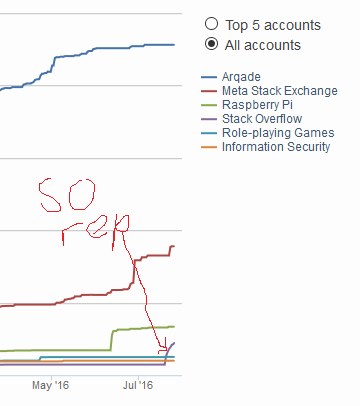Documentation. Also known as a gold mine for people who love to get easy reputation points. Right now it's being (ab)used by many users, some of whom are using it to exponentially increase their reputation points.
Currently, upvotes on examples give all contributors +5 rep. There are no limits on the amount of rep you can gain from an example, except for the standard 200 rep per day limit. This system is severely broken.
For example, I contributed one sentence to the Python 'Hello world' example, to revert an edit made by another user (which should have been rejected) and add a single (relatively unimportant) sentence. Since then, I have received more than 300 reputation, tripling my Stack Overflow reputation points. And I continue to get reputation, even though the sentence I added is no longer there! I don't deserve this.
Why does reputation even matter that much? Surely a bit of inflation caused by documentation can't hurt?
Yes, theoretically reputation is just a form of imaginary Internet points. But it still determines privileges on Stack Overflow. We don't want a bunch of low-rep users with high-rep features, do we? Also, in the professional world, employers do use your Stack Overflow reputation as a rough gauge of your programming ability, but Documentation is making it look worthless.
I think that this system is severely broken at the moment, and we need to introduce some more reputation limits to fix it. I have a few ideas which would reward substantiate edits while reducing the possibility to farm reputation points. (Note that some of these ideas were seeded by Jon Ericson and sokin's answers.)
Idea 1: Only reward editors whose contributions still make up a substantial part of the example.
Basically, an editor should only be rewarded if the content they contributed makes up more than x% of the whole example (e.g. around 10 or 20 percent). How 'their content' is counted is debatable, but possible systems include:
- Counting based on whoever last modified a line (e.g.
git blame) - Counting based on the number of words which are still part of the example
Whether or not the example creator always receives reputation points or not is also debatable.
Idea 2: Introduce a reputation points cap per-example
There should be a reputation points cap of (e.g.) 50 reputation per example, so single edits won't produce huge amounts of reputation. Subsequent edits could possibly allow a higher cap.
Alternative
The reputation points cap could only be introduced when a large number of people edit an example. E.g. once more than 5 or 10 people edit an example, further editors cannot gain any more than 50 rep for that example. Previous editors can keep any excess reputation points they have accumulated.
Idea 3: Scale reputation points awarded per-upvote, based on number of editors
If an example only has 5 or so editors, each person will be awarded the full 5 reputation for every upvote. But, once an example reaches 10 or so editors, each upvote may only be worth 3 reputation; and when there are 20 editors each upvote will only be worth 1 reputation.
This way, the amount of reputation received from upvotes is proportional to your contribution to the example.
Alternative
Instead, reputation per upvote could be scaled by the amount you have contributed to an example: if you have only contributed a few words, you only get a few reputation points; if you wrote most of the documentation, you will get a larger share of the reputation points awarded. This would probably be a better way to scale reputation points, but is more complex.
Idea 4: Do not award reputation points if your contribution has been overwritten or removed
This bit is obvious - if your contribution isn't part of the example any more, you shouldn't be getting any reputation for it.
Hopefully if some of these suggestions are implemented, reputation points will be a better representation of your activity and helpfulness on Stack Overflow - not some huge number caused by a couple of tiny edits to documentation. Of course, a reputation points recalc will probably be required to bring things back to normal.



